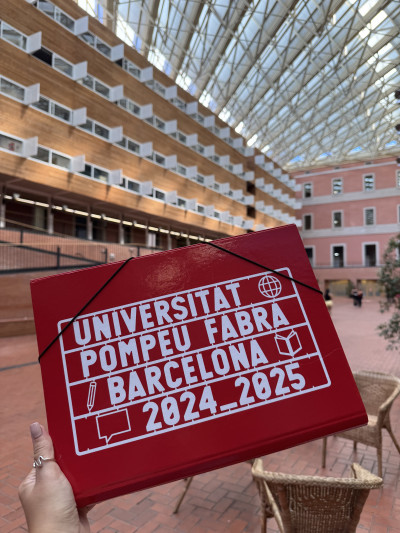This blog post reflects on my experience as an international student in the Master’s in Migration Studies at UPF in Barcelona. With my background in Law and European Studies along with experience working in the Asylum and Migration Policy Department at the Czech Ministry of the Interior, I chose this program to deepen my knowledge of key migration issues and theories. The program has broadened my perspective on migration and has enriched my understanding of legal, social, and human rights challenges related to migration policy and its global impact.
My Background
Studying as an international student at Universitat Pompeu Fabra (UPF) in Barcelona has been an amazing experience, allowing me to combine my passion for migration studies with my background in law.
After completing my bachelor's degree in European Studies and working at the Czech Ministry of the Interior in the Asylum and Migration Policy Department for almost two and a half years, I felt the need to deepen my understanding of migration issues from a more academic perspective. The Master's in Migration Studies at UPF provides an ideal platform to enhance knowledge and explore the complexities of migration and migration policies on a global scale.
Structure of the Master's Program
The Master's program in Migration Studies offers a comprehensive and interdisciplinary approach to understanding migration-related issues. The curriculum includes compulsory courses that provide a strong foundation in immigration politics, public policies, migration theories, and European immigration law. Students also engage in research seminars throughout the program and complete a final research paper, allowing them to develop in-depth expertise in their chosen areas of study.
For optional courses, students can tailor their learning experience by selecting between two profiles: the researcher profile, which emphasizes methodological and theoretical approaches, and the expert profile, which focuses on practical applications of migration policies. Optional courses explore key topics such as immigration governance, the geopolitics of migration with a focus on the Mediterranean, postcolonial perspectives, diversity and discrimination, forced migration and asylum, and labor market integration.
Focus on Human Rights and Non-Refoulement
The subjects I have enjoyed most in the program were those that addressed the human rights implications of migration. As someone deeply committed to studying forced migration and the protection of migrants, I find it incredibly rewarding to explore these issues from both theoretical and practical standpoints.
My academic interests are primarily focused on the principle of non-refoulement, which prohibits the expulsion or return of refugees to a country where they may face danger. This issue is not only a central part of my research but also a central theme of my thesis, where I am analyzing the legal and human rights challenges surrounding non-refoulement in various migration paths within the European context.
I am also concerned with how non-refoulement is being applied – or in some cases, undermined – through various European externalization agreements with third countries. Externalization refers to the strategies employed by European Union countries to manage migration flows by outsourcing border control responsibilities to non-EU countries, such as Libya, where migrants are vulnerable to exploitation, detention, and abuse.
Intercultural Learning and International Community
My experience in Barcelona has also provided me with the opportunity to engage with a diverse and international community of students, researchers, and professors. The multicultural environment at UPF allows for rich discussions and a variety of perspectives on migration-related topics. This diversity has been instrumental in broadening my understanding of how migration affects different regions of the world and the global challenges it presents.
The opportunity to study alongside peers from various countries, each bringing their own unique experiences and insights into the conversation, has made the learning experience even more enriching.
Life in Barcelona as an International Student
As an international student, I have also been able to immerse myself in the vibrant cultural life of Barcelona. The city is a melting pot of cultures, with a rich history and a dynamic atmosphere that fosters creativity and collaboration. Living here has not only allowed me to expand my academic knowledge but has also contributed to my personal growth.
The experience of living in a foreign country, adapting to a new culture, and learning a new language has been both challenging and rewarding. Barcelona is a city that welcomes people from all over the world, and I have felt incredibly fortunate to be a part of this diverse community.
Future Changes to the Program
It is important to note that this master's program will not be offered as a separate program next year. Instead, it will be integrated as a track within the broader Master's in Governance, enabling students to specialize in migration studies within that framework.
Conclusion
In conclusion, my experience as an international student at UPF in Barcelona has been incredibly rewarding. I have had the chance to study in an intellectually stimulating environment, surrounded by like-minded individuals who share my passion for migration and human rights.
Although some of the subjects fall outside of my traditional legal background, they have greatly enriched my understanding of migration and its complexities. I am looking forward to continuing my studies and contributing to the field of migration studies with the aim of advocating for a more humane approach to migration policies.
Photograph:
Campus Ciutadella is one of the three campuses of UPF. Universitat Pompeu Fabra, author: Caroline Bindačová, September 26, 2024.


